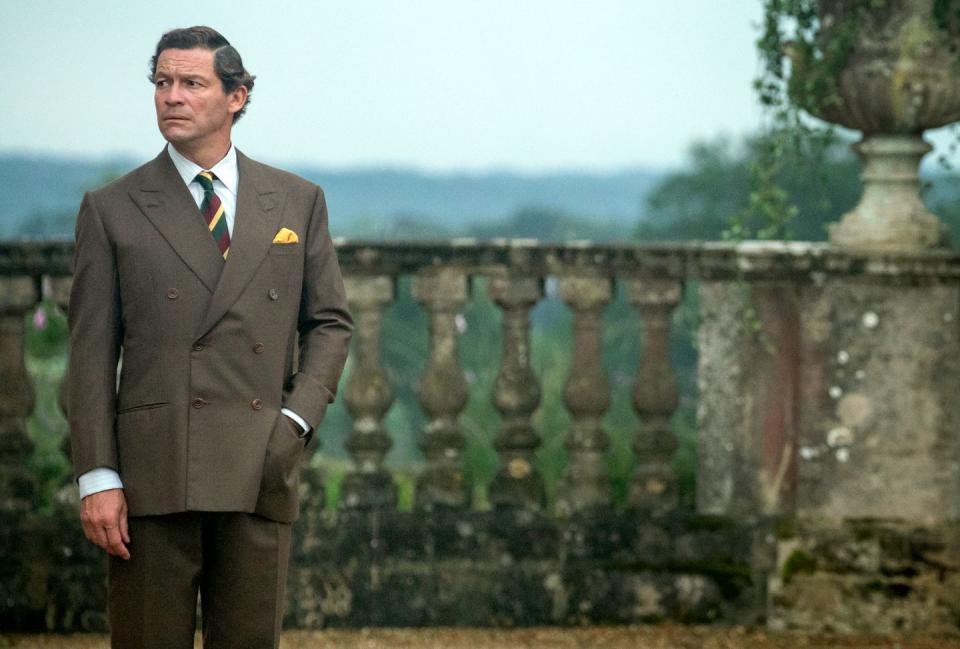What Did The Public Really Think of the Queen and Prince Charles in the 1990s?

- Oops!Something went wrong.Please try again later.
- Oops!Something went wrong.Please try again later.
- Oops!Something went wrong.Please try again later.
- Oops!Something went wrong.Please try again later.
- Oops!Something went wrong.Please try again later.
It is a decade that has long been thought of as very challenging for the royal family. And so, as The Crown reaches the 1990s in new episodes airing this week, it is not just the blending of fact and fiction that is causing debate but also the raw revival of a difficult era. Famed for 1992’s “annus horribilis” and Princess Diana’s 1997 death that rocked the world, this was a decade that was both turbulent and traumatic.
How the public perceived the royal family throughout the 1990s is made central to the plot of The Crown’s fifth season, with episode one revolving around a Sunday Times report of a poll showing that the public thought Prince Charles should take over from the Queen. The Crown’s plot features royal aides and Prince Philip conspiring to keep the newspaper from the Queen as she holidays on the Royal Yacht Britannia. And the episode goes on to show Prince Charles meeting with Prime Minister John Major to float the suggestion he could indeed step in.

A spokesperson for John Major said last month that no such “improbable and improper” conversation took place—his intervention highlighting an intriguing factor of the Netflix series having reached a time when many portrayed on screen are still alive to set the record straight. A BBC reviewer who dug out a real 1990 Sunday Times story about a poll pointed it out as a “blandly positive piece,” very different in character to the story being told on screen. Yet the question of how the monarchy was received by the public three decades ago has been brought to the fore once again.
The real Sunday Times story, from January 1990, reported on a poll that found nine out of 10 people felt mainly or very favorable about the monarchy and that the Queen Mother, the Queen, and Prince Charles were the most popular royals. It also found that almost half would support the Queen abdicating at some stage.
Other polling around the early 1990s on the monarchy includes Ipsos Mori statistics which found that in June 1991 82% of people thought Prince Charles would make a good king in the future, with just 5% thinking he would make a bad one. However, according to the same pollster, these figures had shifted dramatically towards the end of the decade, by which time almost as many people thought he would be a bad king as a good one.
The National Centre for Social Research, Britain’s independent social research organization, has tracked opinion over time on the royal family and found that there was a significant shift in the 1990s over people’s feelings on the institution. They recorded a notable drop between 1983 and 1994 in how many people felt it was important for Britain to have a monarchy—down from 87% to 66%. In the following decades, the figures never came back up, but findings that around two thirds of Britons support the monarchy has remained stable across many polls for the past 30 years.
Princess Diana’s death in 1997 is often cited as one of the few times when the Queen’s actions were out of step with the sentiment of her people and she received much criticism as a result. Between Diana’s death and her funeral, Ipsos Mori carried out a poll on behalf of ABC news which found that 57% of British people had a favorable opinion of the Queen and 40% of Prince Charles. In the Queen's case, this was lower than the approval ratings of more like 80% that she enjoyed towards the end of her reign. Some 58% also said they disapproved of the way that the royal family had handled Charles and Diana’s divorce and 52% said they disapproved of how they had handled Diana's death. The poll strongly suggested that the public sided with Diana, with 66% saying they thought the royal family should conduct themselves like her in the future. The poll also asked the public what they thought of Camilla one day becoming Queen, to which 86% replied she should not. Just 7% approved.
You Might Also Like

